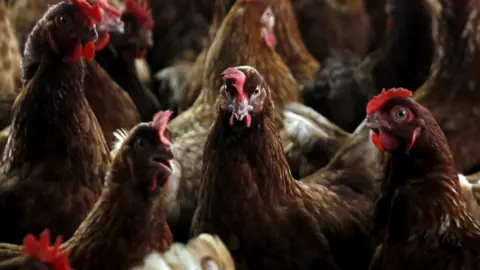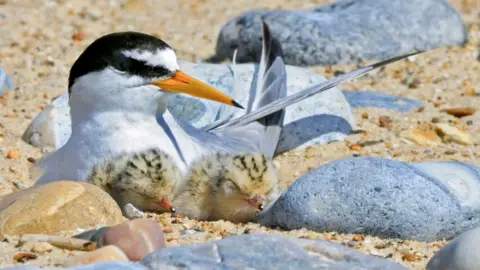Avian flu spread sees call to keep birds inside
 Reuters
ReutersMore avian flu outbreaks has led to calls for poultry and kept birds across Britain to be housed indoors, to prevent further spread.
An outbreak confirmed in Snettisham, near Hunstanton, on Sunday, saw a 3km (1.8-mile) monitoring zone being put in place. A total of 32 housing orders cover areas across England.
Speaking to the BBC's Farming Today programme, Gary Ford from the British Free Range Egg Producers Association, said: "In our view, there is sufficient evidence to extend the housing order across GB."
The government's chief vet said it was monitoring the disease and any risk to more areas.
Housing orders have come into force in parts of Norfolk, Suffolk and Lincolnshire, along with places further afield including Herefordshire, Worcestershire, Shropshire, Cheshire, Merseyside, Lancashire and Yorkshire.
It follows the discovery of dead wild birds affected by the H5NI virus and one case of H5N5.
Norfolk has had 12 confirmed outbreaks of bird flu this winter season, but only two protection zones are currently in force.
'Farmers are absolutely worried'
Chief vet, Dr Christine Middlemiss, said the Department for Environment, Food and Rural Affairs (Defra) had so far decided against a countrywide order, "because we haven't seen either the level of infection or any infection in wild birds in the other areas, nor have we picked up cases there.
"So the risk in those other regions is lower."
Dr Middlemiss said it was keeping matters under constant review and regularly sampling wild birds for disease.
She said a number of outbreaks had also occurred in premises where birds were already housed.
But Mr Ford said he wanted a stronger response to "get ahead" of the disease, and called for a "proactive approach".
"Because farmers are absolutely worried and concerned that this dreadful disease could visit their farm," he said.
"We've got to do the right thing for the birds, our flocks and the farmers themselves."
 RSPB/PA Media
RSPB/PA MediaDr Alan Atkinson, of the British Trust for Ornithology (BTO) based in Thetford, Norfolk, said the charity had noticed more cases of bird flu in more species over the past three years.
"Last summer, we saw relatively little bird flu in wild bird populations," he said.
"But recently, in the past few weeks, we've seen a real uptick in the number of particularly wildfowl - so geese, ducks and swans and gulls - which are being found dead or sick with avian flu."
Dr Atkinson said the virus had been having a major impact on seabirds, adding it was "difficult" to contain among wild birds.
"Where we might be able to do something about it is in breeding colonies," he said.
"And one thing that has been trialled is the removal of carcasses on a regular basis, to try and limit the spread."
He said the charity was hoping affected wild bird species, such as great skewers that have seen populations decimated by 50%, would be able to recover.
Other seabirds with "very large mortality" rates included terns, gulls, gannets and kittiwakes, he said.
Follow Norfolk news on BBC Sounds, Facebook, Instagram and X.
